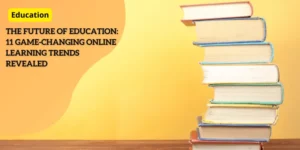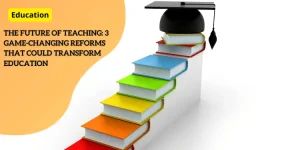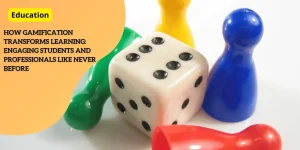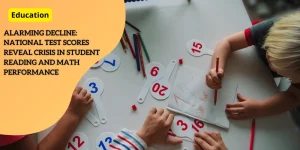Teachers Sound Alarm on Young Learners’ Social-Emotional Deficits
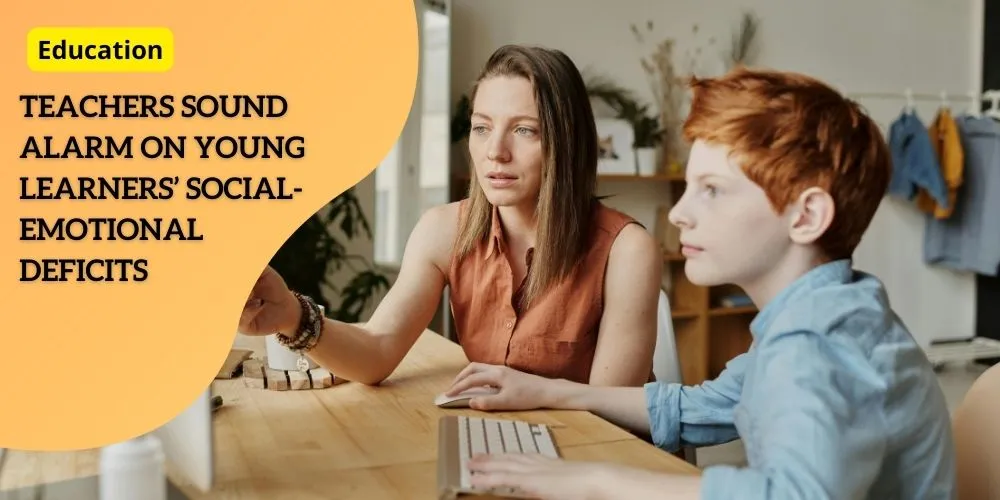
Anúncios
Pandemic’s Impact on Young Learners
The pandemic has left its mark on many facets of life, with young learners feeling the brunt in unexpected ways.
Teachers report that students are struggling notably with fine motor skills and social-emotional capacities.
Anúncios
Disruptions like school closures and the shift to remote learning have exacerbated these issues, limiting essential classroom experiences and traditional hands-on activities.
Specific Skill Deficits Observed
Tasks as simple as using scissors, crayons, or pencils have become hurdles for many young students.
Anúncios
Skills such as tying shoes are also lagging, showcasing the tangible effects of the pandemic’s social distancing measures and increased screen time.
Furthermore, social-emotional skills such as listening, following directions, sharing, and cooperating are also underdeveloped in many children.
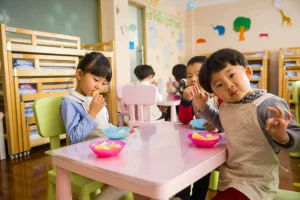 We are still witnessing the impact of the pandemic on young people
We are still witnessing the impact of the pandemic on young people
Potential Causes for Skill Deficits
The most apparent causes are the school closures and the necessity for remote learning during the pandemic.
These changes disrupted the regular, face-to-face interactions that build fine motor and social-emotional skills.
The increase in screen time has also impacted focus and limited opportunities to engage with traditional, hands-on learning tools and peer interactions.
Equity Concerns and Achievement Gaps
Children of color and those from low-income households are disproportionately affected. Teachers in schools with higher minority and low-income populations report more pronounced challenges.
This discrepancy highlights deep-seated inequities that the pandemic has only worsened.
For example, 83% of teachers in schools with predominantly low-income students indicated that using classroom supplies like scissors and pencils is more challenging now.
In contrast, this figure was 68% among teachers in more affluent schools
Addressing the Challenges
To mitigate these deficits, it’s crucial for school leaders to support teachers in reinforcing classroom norms and expectations.
Teachers need resources and collaboration with caregivers to address students’ evolving needs.
This multifaceted approach will help in creating a supportive environment that fosters students’ development in both academic and social-emotional capacities.
Specific Skill Deficits Observed
Fine Motor Skills
Young learners are increasingly struggling with fine motor skills – essential tasks like using scissors, crayons, and pencils, as well as tying their shoes.
These challenges are more significant now than they were five years ago. Teachers in preK-3 grades have noticed a marked decline in these skills among their students.
Such basic yet crucial skills play a vital role in a child’s overall development and school readiness.
Social-Emotional Skills
Likewise, social-emotional skills such as listening, following directions, sharing, and cooperating are lagging. These skills are pivotal for classroom harmony and student interaction.
The difficulties in these areas are starkly evident when comparing current students to those before the pandemic.
According to the Education Week State of Teaching survey, a significant number of teachers report these skills as more challenging for children today.
Wider Observations
The National Institute for Early Education Research (NIEER) found similar issues in parent surveys.
The prolonged period of disrupted schooling and increased screen time are among the culprits hampering young students’ ability to practice these vital skills.
Even children not in grade school during remote learning have been affected due to missed social interactions.
Disparities Across Demographics
Children of color and those from low-income households are particularly hard-hit by these deficits.
Surveys reveal that students in schools with higher minority populations and low-income students struggle more with these skills.
For instance, a majority of teachers in such schools find tasks like tying shoes and using scissors significantly more challenging for their students compared to their peers in more affluent schools.
Need for Support
The survey results underscore the urgent need for increased support for teachers.
Addressing these skill deficits requires targeted resources and collaboration with caregivers.
Schools must adapt to ensure children can catch up and develop these foundational skills, which are crucial for their long-term academic and social success. “`
Potential Reasons for Skill Deficits
Disrupted Classroom Learning
The pandemic has significantly disrupted traditional classroom learning. Schools closed and many students faced remote learning instead of the hands-on experiences that they would have had in a typical classroom setting.
This affected everything from fine motor skills to social-emotional learning.
Without the opportunity to interact directly with teachers and peers, students missed out on crucial developmental milestones.
Heightened Screen Time
Another notable factor is the increase in screen time.
With remote learning becoming the norm, children spent more time in front of screens.
Studies have shown that excessive screen time can impact attention spans and decrease opportunities for practicing essential skills like using scissors and crayons.
Children are not engaging in physical activities and interactions that traditionally help in skill development.
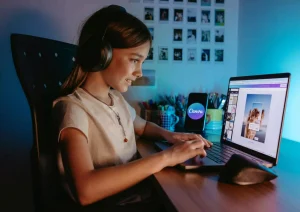 After the pandemic, children are still adapting
After the pandemic, children are still adapting
Children of Color and Low-Income Families Hit Harder
The effects of these disruptions are not evenly distributed.
hildren of color and those from low-income households have been disproportionately impacted.
Teachers have reported that students in schools with higher minority populations are facing greater challenges with both fine motor and social-emotional skills.
These students are returning to classrooms less prepared than their peers, widening existing achievement gaps.
Practical Implications for Early Learning
Lack of early intervention and support for students with disabilities further exacerbates the issue.
Many of these students missed out on critical services during the lockdowns, placing them at an even greater disadvantage.
Teachers are now faced with the daunting task of addressing these deficits in already stressed classroom environments.
To sum up, the combined effects of disrupted classroom learning and increased screen time have significantly impeded young students’ development in critical areas.
Teachers and school leaders need to collaborate strongly with caregivers to support and address these evolving needs
Equity Concerns and Achievement Gaps
Disparities in Motor Skills Development
The pandemic has hit everyone hard, but its impact isn’t evenly distributed.
Many teachers are observing that children of color and those from low-income households are particularly struggling with fine motor skills.
For instance, 89% of teachers in schools with a majority of Black students reported difficulties with tasks like using scissors, crayons, and pencils, compared to lower percentages in schools with majority Hispanic and White students .
Challenges in Social-Emotional Skills
The same disproportionate effect is seen in social-emotional skills.
Teachers in schools with higher minority populations report greater challenges in getting students to listen, follow directions, and take turns.
These skills are crucial for creating a supportive and coherent classroom environment, but they seem to be lagging, particularly in communities that were already underserved before the pandemic.
Linking Socioeconomic Status and Skill Deficits
Children from low-income households are not just more likely to struggle with fine motor skills but also face significant setbacks in social-emotional and academic areas.
For example, in schools where over three-quarters of students receive free and reduced-price lunch, 83% of teachers reported more challenges with basic tasks like using classroom supplies compared to only 68% in more affluent schools.
These disparities highlight significant equity concerns that can widen the existing achievement gaps.
Addressing the Gaps
It’s crucial to tackle these issues head-on. School leaders should focus on providing additional support and resources to teachers, especially in schools with higher minority and low-income populations.
Collaborating with caregivers is equally important to address the changing needs of students. Flexibility, responsiveness, and adaptability are key in this challenging landscape, ensuring that every child has the opportunity to catch up and thrive. “`
Long-term Implications and Classroom Impact
The pandemic’s effects on young learners are not just short-term; they have long-lasting impacts that educators are grappling with today.
Delays in social-emotional and academic skills due to missed classroom time and increased screen exposure are a significant concern.
Social-Emotional Delays
When students struggle with listening, following directions, and turn-taking, the classroom environment can become chaotic.
These basic skills are critical for creating a respectful and functional learning space.
When students lack social-emotional skills, teachers end up spending more time managing behaviors rather than educating.
This can lead to a less productive learning experience for all students.
Academic Implications
Delays in foundational skills, such as language abilities, can set students back for years.
These early academic skills are building blocks for future learning.
When children are behind in areas like reading or basic arithmetic, catching up becomes significantly harder as new material builds on these early concepts.
Disruption in Classroom Dynamics
Students who have not developed adequate social-emotional skills disrupt the learning environment.
For instance, if a child can’t take turns or listen to directions, it affects not just their learning but that of their peers as well.
This disruption creates a stressful atmosphere for both students and teachers.
Emotional Toll on Teachers
Teachers report feeling drained and unsupported when managing classrooms with widespread skill deficits. Without adequate support, their emotional bandwidth is stretched thin. Teachers need resources, flexible schedules, and emotional support to adapt to the changing needs of their students and to effectively address these challenges.
Creating a Path Forward
Addressing these challenges involves collaboration between school leaders, teachers, and caregivers.
School leaders need to ensure that teachers are equipped to reinforce classroom norms and expectations.
Engaging caregivers is also crucial for reinforcing these skills at home. Families’ needs are continually evolving, and support structures must adapt accordingly.
By recognizing the long-term implications of these skill deficits, educators and policymakers can better prepare to support young learners in overcoming the challenges they face.
Addressing the Challenges
Support from School Leaders
School leaders play a crucial role in helping teachers catch up with students’ social-emotional and fine motor skill deficits.
They need to ensure that teachers have access to resources and training that emphasize these foundational skills.
By fostering an environment of support, leaders can provide teachers with the emotional bandwidth needed to manage the daily rigors of a classroom incurred by these deficits.
Collaboration with Caregivers
Teachers also need to work closely with caregivers to reinforce these skills at home.
Establishing a strong communication channel between school and home can help create a cohesive approach to addressing these challenges.
Caregivers need guidance on how to support skill development, considering that family dynamics and needs have evolved significantly over the past few years.
Resource Allocation
Providing the necessary tools and materials for hands-on learning is vital in classrooms.
Teachers need access to supplies that help students practice fine motor skills, like scissors, crayons, and pencils.
Additionally, they need training programs focused on social-emotional learning techniques to better guide students in listening, following directions, and cooperating with peers.
Community Engagement
Engaging the larger school community, including local organizations and mental health professionals, can bolster efforts to address these skill deficits.
Workshops and support groups for parents and after-school programs can offer additional layers of support, helping to create a well-rounded approach to these challenges.
By collectively working towards these goals, the adverse effects brought about by the pandemic on young learners’ developmental skills can be mitigated.
Did you like the article? Read another one here.


